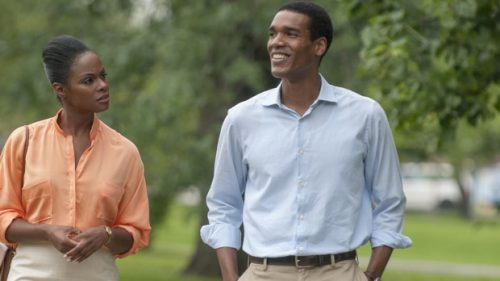Southside with You: Michelle and Barack’s Day Off, by David Bax
In one of the early scenes (and in many more of the later ones) in Richard Tanne’s Southside with You, the male lead takes a long, slow drag from a cigarette. In 1989 Chicago, this wasn’t a particularly remarkable action. Yet the moment has an impact on the audience because, of course, we all know that young man who’s smoking is the future President Barack Obama and the young woman he’s on his way to meet after spritzing his car with air freshener is the future First Lady Michelle Obama. This literal date movie, while not a biopic, assumes that we know who its leads are and who they will be. If the question is whether this story would work with fictional characters, the answer is first, probably not this well, and second, that doesn’t really matter. They are who they are not because Tanne wants us to know them better as humans—that seems to be furthest from his mind—but because he wants to use them as symbols to explore notions of change and how to achieve it. The nature of this film will be a draw to some and a repellent to others. But if it’s intended to be a glorification of President Obama or an apologia for his shortcomings in office, it’s subtle enough about it to be ignored. Instead, Southside with You is an impassioned political science dissertation that has an uncommon appreciation of humanity.
Barack (Parker Sawyers) is a Harvard student spending his summer as an associate in a Chicago law office. His adviser at the firm is Michelle Robinson (Tika Sumpter). In a potentially inappropriate move, he has asked her to join him for a social outing. Over the course of one long day, they’ll flip through records, attend a community organization meeting, see a movie and talk about their pasts, their futures and themselves.
Tanne’s smartest move is to make Michelle the star. Doing so helps him avoid hagiography while also providing a fresh perspective on the man in question, that of a fiercely capable woman who is at least as smart he is and not easily impressed. The clearly intended result of this is that Barack often comes off as arrogant, a man with less experience than his date who nevertheless repeatedly behaves as if he knows better than she does. Instead of anger or dismissal, though, she reacts by challenging him. He pushes, she pushes back harder. Theirs is an intellectual flirtation in which they whet one another’s minds.
All of this unfolds with a pleasant ease, though a deliberately paced one. The most obvious and the most apt analog here is Richard Linklater’s Before Sunrise, though the 1980s Chicago setting also calls to mind John Hughes. Just imagine Some Kind of Wonderful or Ferris Bueller’s Day Off if the characters were black and the topics discussed more overtly political.
Tanne’s style is his own, though (well, with the help of cinematographer Patrick Scola and the sound department). He mostly avoids close-ups, opting instead for spacious, open frames. The tactility of the physical locations and the warmth of the ambient sound design serve to contextualize the subjects in an aesthetic that mirrors Southside’s thematic goals.
Tanne’s mission statement is to make an argument in favor of pragmatism and diplomacy. That may not read as the sexiest subject matter for a movie but, time and time again, he gives us scenes where even tempers and a willingness to compromise lead to greater understanding, harmony and progress. We see it in the neighborhood group that wants a community center; in the disparate interpretations black and white viewers have of Spike Lee’s Do the Right Thing; and, finally, in the way that Michelle and Barack grow closer by focusing on those things on which they don’t agree. Southside with You believes dearly in hope, no matter what’s keeping us apart. In one scene, the movie’s Barack Obama says, “Most people are basically, at their core, good people.” That’s only a cliché if you approach it cynically. In Tanne’s confident hands, it’s a source of quiet power.






























